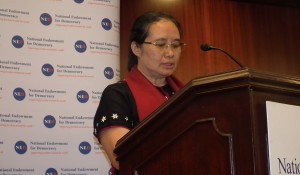The Mae Tao Clinic on the Thai Burma border treats as many as 150,000 migrants and refugees each year, has now called for the Burma government to make the restructuring of its worn-out health system a funding priority.
 Dr. Cynthia Maung, the founder of the Mae Tao Clinic, provided insights in a briefing paper after she met with members of the government’s ‘peace-talk delegation that visited her clinic and that was led by Minister U Aung Min.
Dr. Cynthia Maung, the founder of the Mae Tao Clinic, provided insights in a briefing paper after she met with members of the government’s ‘peace-talk delegation that visited her clinic and that was led by Minister U Aung Min.
Mae Tao Clinic’s briefing paper makes clear its position on “continuing to provide crucial health services on the Thai-Burma border and identifies three key areas that the government must prioritize in order to begin addressing Burma’s current underfunded and highly centralized health system that is not able to meet people’s needs, especially in ethnic areas.”
Dr Cynthia said that there was no truth in the rumors that MTC would return to Burma.
“We want everyone to know that the Mae Tao Clinic is not going back to Burma. Our services are still very much needed along the border – the government has a long way to go to provide adequate health care to the people of Burma, especially those in ethnic areas.”
The briefing paper explained that Dr. Cynthia raised a number of key issues with the government’s delegation. These included – “improving local cross border collaboration and referral system between the Mae Tao Clinic, the Myawaddy Hospital and the Mae Sot Hospital, developing solutions for addressing statelessness in children born on the Thai-Burma border to Burmese parents, and the need for accreditation and recognition of the skills of those working in health, education, community development and social work on the Thai-Burma border.”
Dr Cynthia pointed out that the government delegation that visited the MTC were not qualified to deal with the health issues facing Burma.
“Unfortunately, the people from the government side who joined the recent meetings did not have the necessary knowledge, experience or positions to be able to address these key issues. I hope that if the government wants to meet again, they will bring the right people so our conversations can have concrete outcomes towards improving health services along the border and inside Burma.”
The MTC briefing paper spelt out that for future meetings between the government and the Clinic to be useful they needed to be planned, have an agenda and to be have “prior permission from Thai authorities.”
Dr Cynthia added.
“We welcome the government’s interest in meeting with us and discussing health services, but we want future meetings to be official and productive in beginning to address the longstanding problems’ the people of Burma have faced, especially relating to health care needs in ethnic areas that have suffered under decades of armed conflict.”


